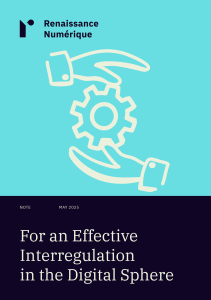Publication 14 May 2025
For an Effective Interregulation in the Digital Sphere

Executive Summary
At the turn of the 2020s, after a period shaped by the structuring and exemplary role of the General Data Protection Regulation (GDPR) — which established a relatively coherent governance framework for personal data protection — the European Union entered a new phase marked by the rapid adoption of new legislative acts. Between 2022 and 2024, five major regulations (the Data Governance Act, Digital Markets Act, Digital Services Act, Data Act, and AI Act) were adopted, each pursuing specific objectives, often complementary but rarely coordinated. This normative proliferation has led to new tensions in the implementation of these instruments, particularly due to their overlap with obligations stemming from the GDPR.
This expansion of regulations has been accompanied by institutional changes. While the the GDPR could rely on singular authorities (data protection authorities) and strong European coordination through the European Data Protection Board (EDPB), the new texts call for multisectoral regulation. The plurality of authorities involved — be they in charge of competition, consumer affairs, media, or security — makes structured cooperation necessary, which remains in its infancy. A logic of “interregulation” is taking shape but struggles to materialise within a system that was not designed for it.
The complexity does not stop at the national level. At the EU level, the multiplication of committees and comitology bodies linked to each regulation hampers overall coherence. Unlike the EDPB, these new structures lack the history of cooperation needed to harmonise practices. At the same time, the European Commission has strengthened its enforcement powers, notably through the growing use of delegated acts, thereby re-centralising part of the regulatory power to the detriment of national authorities.
Faced with this fragmented landscape, Member States must adapt their governance. In France, the response to this dispersion has been the progressive establishment of a coordination network, formally introduced by the law of 21 May 2024 aimed at securing and regulating the digital space (SREN Act). This choice is based both on practical considerations — the specialisation of sectoral regulators — and on an institutional legacy that is not conducive to centralisation. Alongside this diversification of the authorities involved, certain administrations are gaining influence (notably the Directorate General for Competition, Consumer Affairs and Fraud Control (DGCCRF) and the Directorate General for Enterprises (DGE)).
In this context, regulation is also evolving in nature. It is shifting from a primarily reactive logic, based on incident handling, to a more preventive approach inspired by traditional competition regulation. This transformation requires not only better coordination of actions but also a convergence of cultures between authorities, which are sometimes shaped by very different legal and operational traditions.
Finally, another major challenge is emerging: that of expertise. The increasing complexity of the European regulatory framework calls for enhanced technical capabilities — within governing bodies and public administrations, as well as within companies and civil society. Europe will only be able to sustain an ambitious regulatory model if it can rely on pools of trained professionals capable of understanding the intersecting challenges of data, AI, and digital governance.
The regulation of the digital sphere can no longer rely on the mechanisms that ensured the GDPR’s relative success. It now demands a more complex and better-coordinated model. The challenge is twofold: to uphold Europe’s normative ambition in the face of growing international pressures toward deregulation, and to ensure effective, comprehensible implementation for all relevant stakeholders.
To address this dual challenge, Renaissance Numérique puts forward ten proposals for better digital regulation in France.
PROPOSAL 1
PROPOSAL 2
PROPOSAL 3
PROPOSAL 4
PROPOSAL 5
PROPOSAL 6
PROPOSAL 7
PROPOSAL 8
PROPOSAL 9
PROPOSAL 10
Renaissance Numérique warmly thanks the heads of authorities and administrations as well as the additional experts who were interviewed as part of this study:
- Sarah BÉNICHOU, Director, Defender of Rights
- Hélène BONNET, Project Director for Public Policy and Institutional Relations, Digital Regulation Expertise Center (PEReN)
- Benoît COEURÉ, President, French Competition Authority (AdlC)
- Matthieu COURANJOU, Delegate for the Regulation of Digital Platforms, Directorate-General for Media and Cultural Industries (DGMIC), French Ministry of Culture
- Nicolas DEFFIEUX, Director, Digital Regulation Expertise Center (PEReN)
- Laure DE LA RAUDIÈRE, President, Arcep
- Marie-Laure DENIS, President, French Data Protection Authority (CNIL)
- Gabrielle DU BOUCHER, Policy Officer for Tech, Rights and Freedoms, Defender of Rights
- Claire HÉDON, Defender of Rights
- Sarah LACOCHE, Director, Directorate-General for Competition, Consumer Affairs and Fraud Control (DGCCRF), French Ministry of Economy
- Armand LACOMBE, Policy Officer for AI, Directorate-General for Enterprises (DGE), French Ministry of Economy
- Clara-Lou LAGARDE, Head of Department for Supervision and National Coordination, Directorate for Online Platforms, Arcom
- Rodolphe LE RUYET, Technical Adviser to the President, Arcep
- Benoît LOUTREL, Member of the Board, Arcom
- Roch-Olivier MAISTRE, President, Arcom
- Sébastien MONTAIGU, Deputy Delegate for Platform Regulation, Directorate-General for Media and Cultural Industries (DGMIC), French Ministry of Culture
- Lucille PETIT, Director of Online Platforms, Arcom
- Chantal RUBIN, Head of the Digital Platforms Regulation Division, Directorate-General for Enterprises (DGE), French Ministry of Economy
- Rémi STEFANINI, Delegate for Digital Transition, Directorate-General for Competition, Consumer Affairs and Fraud Control (DGCCRF), French Ministry of Economy
-

Publication 12 November 2024
EU Digital Policy: the Time Has Come to Connect the Dots
-

Publication 29 March 2021
Digital Markets Act: A revolution or a legal contradiction?


